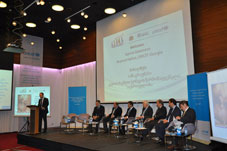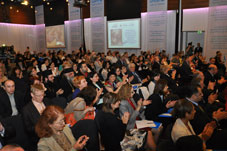
Investing in Georgia’s Future by advocating children’s rights
By Salome Modebadze
Wednesday, June 12
"We want every child to be successful in Georgia despite the financial conditions of their families", Prime Minister Bidzina Ivanishvili said at the conference entitled “Investing in Georgia’s Future – A National Agenda for Early Child Survival and Development” organized by UNICEF on June 11. Stressing that child poverty will eventually grow into adult poverty, Ivanishvili said “through the investment we are now making, we are strengthening future generations of our country so that they can become full members of society who do not rely on the state and make their own contributions to the country’s development.
Stressing that all children should have equal rights, the PM said the state budget is fully committed to the policy of social protection. “We are taking responsibility for the creation of the relevant mechanisms to implement the decisions [which were made at the conference] which will improve the quality of life of children,” he added.
Early childhood development is aided by a combination of health care services, nutrition advice, parenting education programmes, pre-school services, poverty alleviation, and child care support targeted directly at children under 5 years and their families.
Sascha Graumann, Representative of UNICEF, Georgia said investing in early child survival and development is one of the most cost-effective strategies to increase a nation’s human capital, to reduce poverty and overcome inequities. “The way we treat our young children not only shapes their own lives, but the future of our society,” Graumann said, emphasizing that Georgia has to “re-examine how it invests in its future.”
Stressing that it is not acceptable that 77, 000 children live in extreme poverty (according to the studies conducted by UNICEF), Thomas Hammarberg, EU Special Adviser on Human Rights to Georgia said “children do have rights.”
Hammarberg said “we live in a period of some economic difficulties” but it would be a great mistake if people wouldn't “invest in children.”
“It is not only for economic reasons that we need to invest in children but they have rights now as well,” EU Special Adviser said, emphasizing that this is why it is so important to look at the situation of children, which “requires preventive, concerted, planned action” and not only rhetoric
Hoping that the conference will bring not only “good political promises” but “also some concrete steps”, he said while education is important for children, professionals who deal with children in their daily lives like teachers, doctors, social workers, police should learn how children react and feel and what rights they have. It is important for these professionals not to ignore what is in the best interests of children.
Richard Norland, Ambassador of the United States of America to Georgia gave the example of the US where a lot of the government's resources and the resources of the private sector have been invested in child protection. The members of the conference stressed the important of inter-governmental cooperation in coordination with local and international organizations working on children’s issues.
The Minister for Education and Science, Giorgi Margvelashvili said there is “a unified readiness” on all sides and an awareness from the legislative and executive bodies of non-governmental and international organizations that something should be done about pre-school education.
Health and nutrition, the establishment of relationships at an early age, the protection of children's rights and the inclusion of children in the family unit are all important parts of a child’s life, which are all developed with the aid of family support.
The Minister for Labour, Healthcare and Social Affairs, Davit Sergeenko said investment alone cannot give results without the proper administration of the resources, as well as the monitoring of results and deciding on the criteria to estimate the success of any measures. According to the minister, from October, 2013 a Social Solidarity Fund will be set up, which will be used to meet the individual healthcare needs or additional social assistance of children born or living in poverty.
Four groups of specialists discussed ways to implement the the following goals: (a) Child Health and Nutrition: Achieving Millennium Development Goal 4, which states the following: reducing child mortality under the age of 5; 100% pre-school education: 100% pre-school attendance by children aged 3-5 and the improved quality of pre-schools; (b) Child Protection: Ensure no child under the age of 6 has to be taken into institutional care; and (c) Child Poverty and Social Benefits for Children: Reducing extreme child poverty within the frames of the conference.
The Declaration on the Commitment to Early Child Survival and Development in Georgia was adopted at the end of the event and outlined that “there are a number of low cost, high impact strategies” that Georgia can pursue by 2015 including universal access to quality pre-school education; achieving the UN Millennium Development Goal; halving extreme poverty among children under 6; and ending the use of institutional care.



